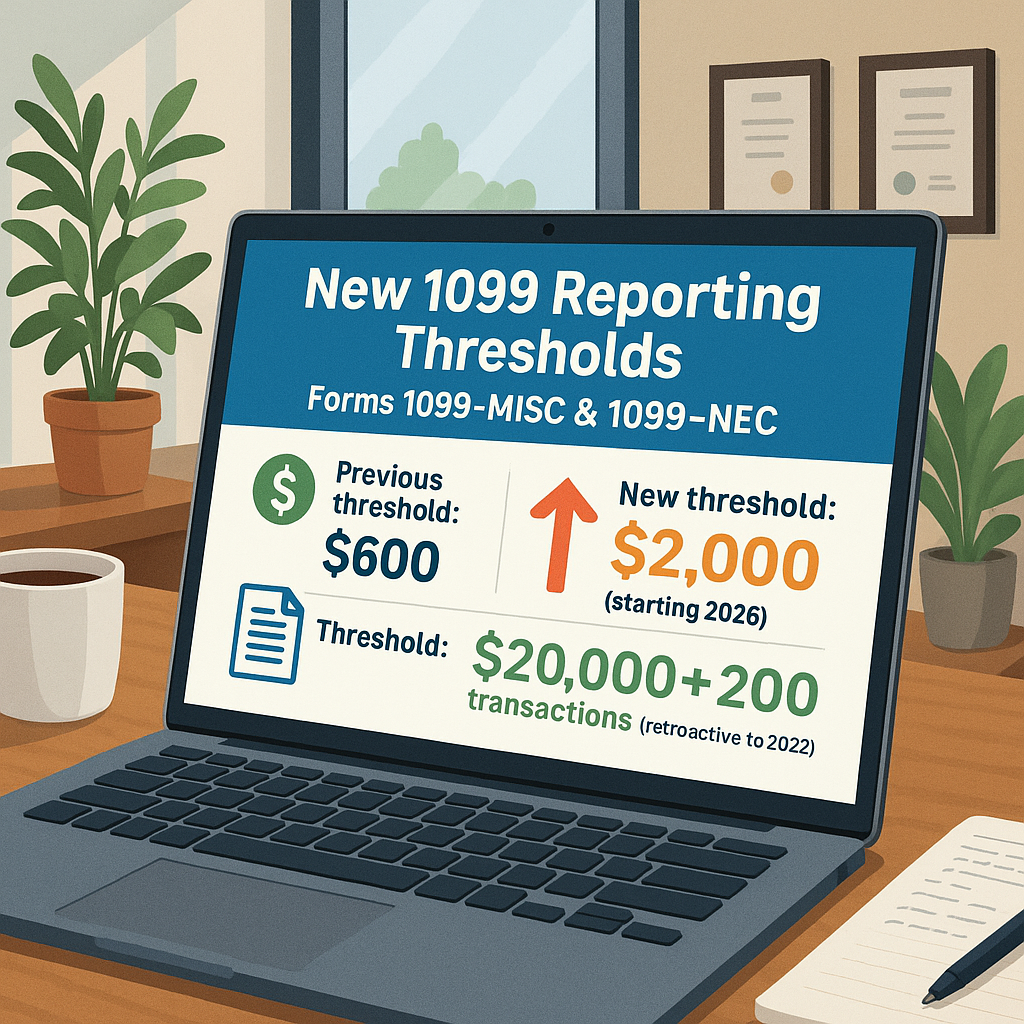The One Big Beautiful Bill Act (OBBBA), enacted on July 4, 2025, has significantly changed the reporting thresholds for several common 1099 forms — including 1099-K, 1099-MISC, and 1099-NEC.
These changes are meant to simplify tax reporting for businesses, freelancers, and gig workers.
Here’s a quick look at the key updates:
1. Forms 1099-MISC and 1099-NEC (Miscellaneous Income & Nonemployee Compensation)
-
New threshold: The reporting threshold will increase from $600 to $2,000, starting with tax year 2026.
-
Annual inflation adjustments: Beginning in 2027, the $2,000 threshold will be adjusted yearly for inflation.
-
Why it matters: This update reduces the number of small payments that need reporting, easing the burden for both businesses and independent contractors.
___________________________________
2. Form 1099-K (Third-Party Network Transactions: Venmo, PayPal, Zelle, etc.)
-
Threshold reverts: The OBBBA reverts the reporting threshold back to its original levels — $20,000 in total payments AND more than 200 transactions in a calendar year.
-
Retroactive application: This change takes effect retroactively for tax year 2022, ensuring all relevant payments from that year are included.
-
Reverses IRS’s phased approach: Prior IRS plans to lower the thresholds ($5,000 for 2024 and $2,500 for 2025) are canceled.
-
Why it matters: This rollback eases reporting requirements for casual sellers and gig workers who use payment apps, while still capturing higher-volume earners.
___________________________________
3. Backup Withholding
-
New requirements effective 2027: Backup withholding will only apply if total payments to a payee exceed the adjusted thresholds for Form 1099-MISC or Form 1099-NEC.
-
Context: Backup withholding is most commonly required when a payee fails to provide a valid taxpayer identification number (TIN).
-
Why it matters: This change will not only reduce unnecessary withholding on smaller transactions but also simplify compliance for payers and payees.
___________________________________
Important Considerations
-
All income remains taxable. Even if you don’t receive a Form 1099, you are still required to report all taxable income unless it is specifically excluded by law.
-
Recordkeeping is essential. Businesses should continue maintaining accurate records of all payments, even those below the reporting thresholds.
-
State requirements may differ. Some states have their own 1099 reporting thresholds that are lower than federal levels, so check your state’s rules for any differences.
-
Future changes are possible. While the OBBBA provides clarity now, taxpayers should stay alert for further legislative updates.
___________________________________
✅ Takeaway: The 1099 threshold changes under OBBA ease federal reporting by raising thresholds and rolling back stricter IRS rules, but accurate recordkeeping and compliance are still key.
Need help keeping up with your filings and staying compliant? eFileBuddy makes filing your 1099s easy, accurate, and stress-free, whether it’s one form or hundreds.
File with eFileBuddy — then cruise into peace of mind!



Leave a Comment